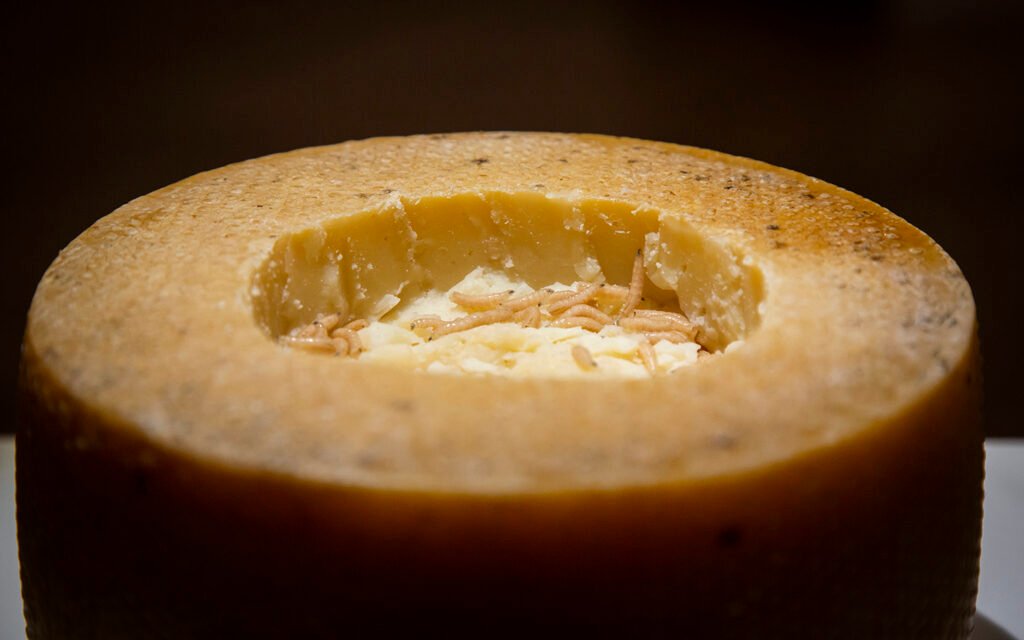Casu Marzu, regularly dubbed the “world’s most dangerous cheese,” is a conventional Sardinian delicacy regarded for its specific fermentation procedure involving live insect larvae.
While its consumption is controversial and banned in many nations due to health concerns, a few enthusiasts and researchers have explored potential health benefits of Casu Marzu, associated with this unconventional cheese.
This article delves into the viable nutritional and health aspects of Casu Marzu, aiming to provide a comprehensive understanding of its place in Sardinian culture and diet.
Casu Marzu: A Cultural and Culinary Overview
Originating from Sardinia, Italy, Casu Marzu is made by introducing live larvae of the cheese fly (Piophila casei) into pecorino cheese.
These larvae promote an advanced level of fermentation, breaking down the cheese’s fats and resulting in a soft, creamy texture.
Despite its pungent aroma and live maggots, Casu Marzu holds a significant place in Sardinian culinary tradition.
Locals often consume it during special occasions, viewing it as a delicacy that embodies their cultural heritage.
Nutritional Profile of Casu Marzu
While specific nutritional analyses of Casu Marzu are limited, its base, pecorino cheese, is known to be rich in protein, calcium, and healthy fats.
The fermentation process involving larvae may further break down complex proteins and fats, potentially enhancing digestibility.
Additionally, the presence of certain microorganisms during fermentation could contribute to probiotic properties, similar to other fermented foods.
Potential Health Benefits of Casu Marzu
The unique fermentation process of Casu Marzu may lead to the breakdown of complex proteins and fats into simpler compounds, potentially making it easier to digest compared to non-fermented cheeses.
Probiotic Properties
Fermented foods are known for their probiotic content, which can support gut health.
While specific studies on Casu Marzu are lacking, the presence of live microorganisms suggests it may offer similar benefits.
Nutrient Density
As a sheep milk cheese, Casu Marzu is likely rich in essential nutrients such as calcium, phosphorus, and vitamin B12, contributing to bone health and metabolic functions.
Health Risks and Controversies
Despite potential benefits, Casu Marzu poses significant health risks.
The live larvae can survive stomach acid and cause intestinal infections, a condition known as enteric myiasis.
Additionally, the cheese may harbor harmful bacteria due to its unconventional fermentation process.
These concerns have led to its ban in the European Union and other countries.
Expert Insight
“While Casu Marzu is a fascinating example of traditional fermentation, the health risks associated with consuming live larvae cannot be overlooked.”
— Dr. Maria Rossi, Food Safety Expert
Casu Marzu in Sardinian Longevity
Sardinia is recognized as a Blue Zone, an area with a high concentration of centenarians.
Some researchers suggest that traditional diets, including the consumption of fermented foods like Casu Marzu, may contribute to this longevity.
However, it’s important to note that longevity is multifactorial, and the role of Casu Marzu remains speculative.
Conclusion: Balancing Tradition and Health
Casu Marzu stands as a testament to Sardinian tradition and the complexities of cultural foods.
While it may offer certain nutritional benefits, the health risks associated with its consumption are significant.
Individuals interested in exploring traditional diets should weigh these factors carefully and consider safer alternatives that provide similar probiotic and nutritional benefits without the associated dangers.
Howard Technology Solutions: Revolutionizing Smart IT Services Now


